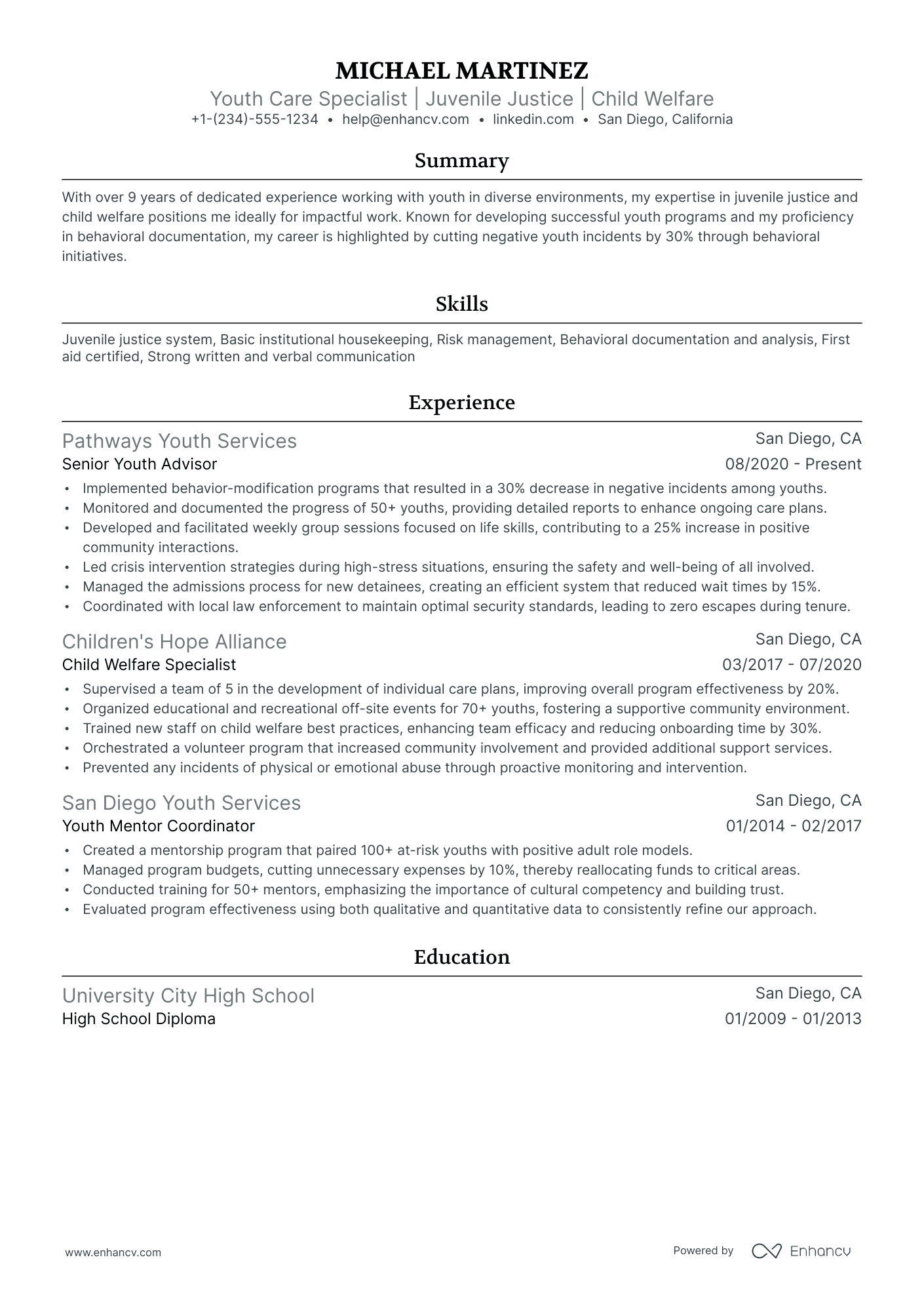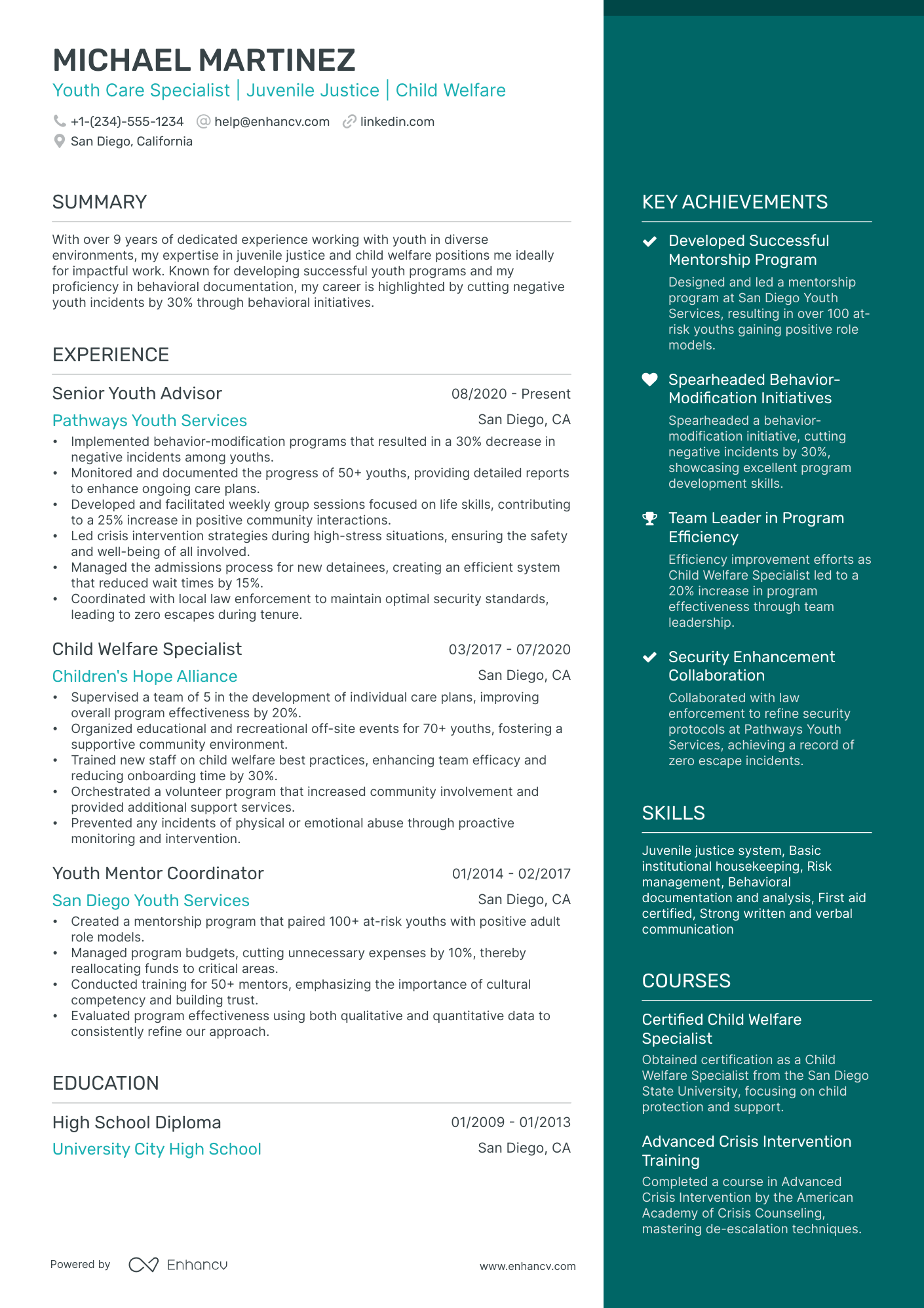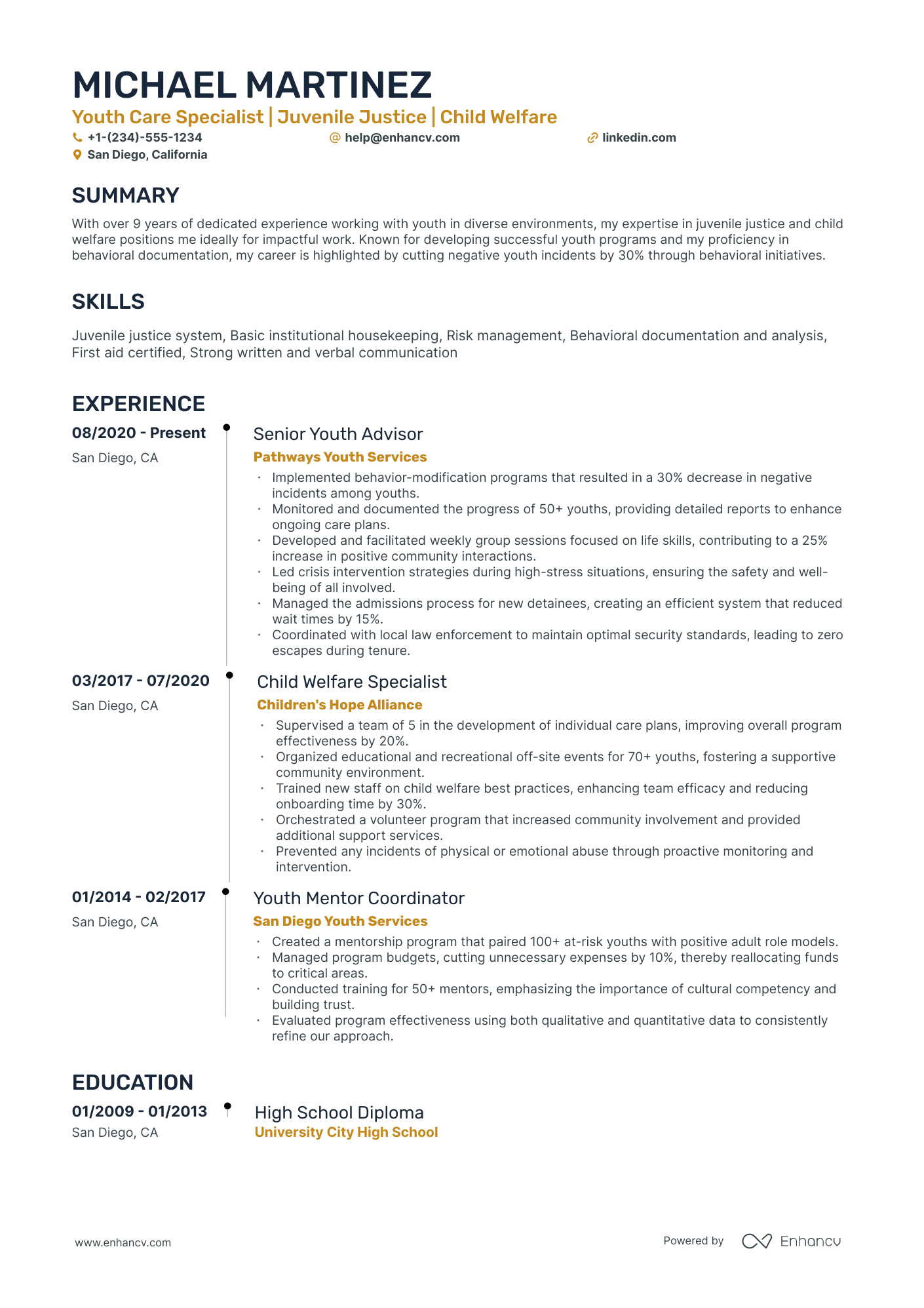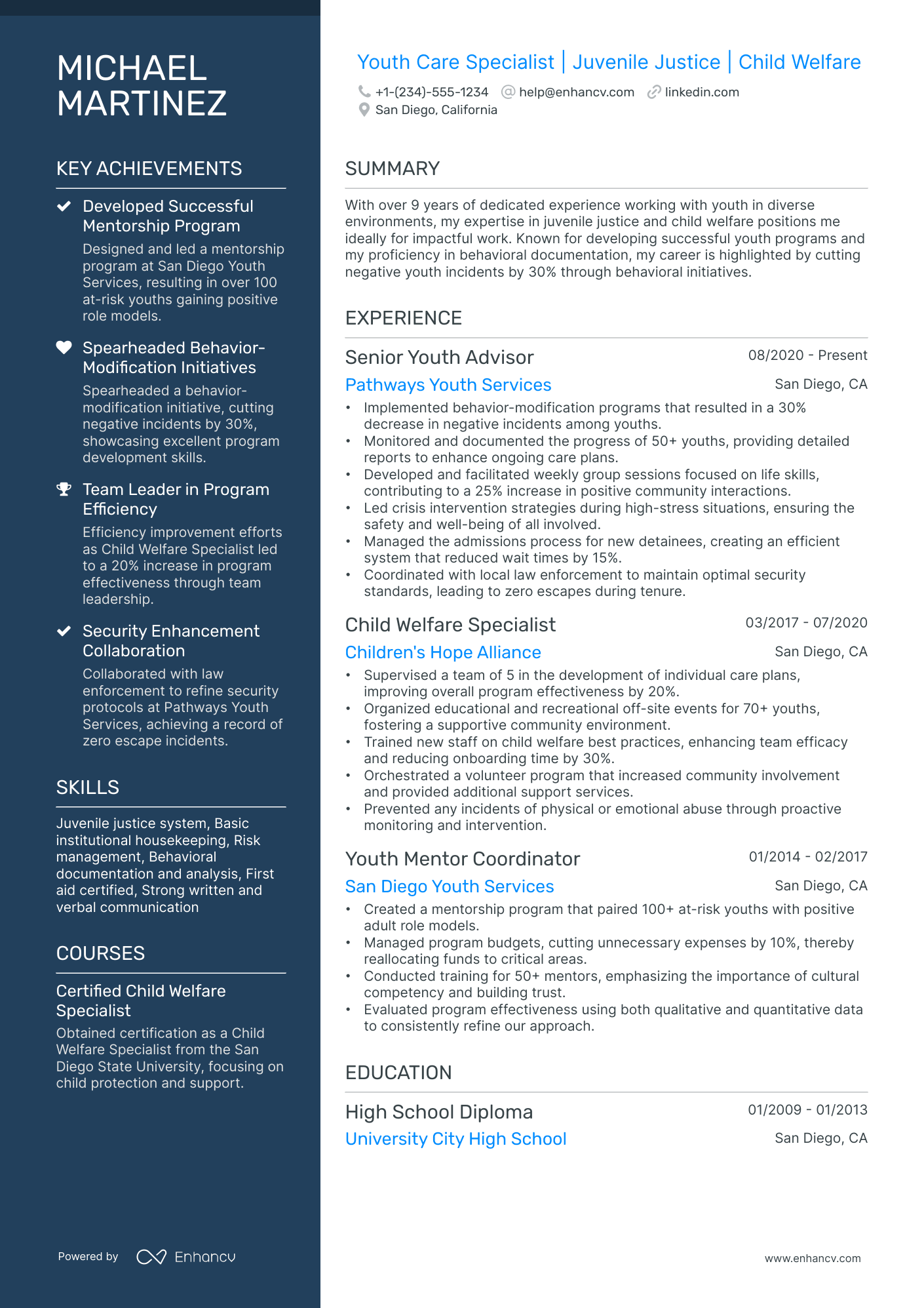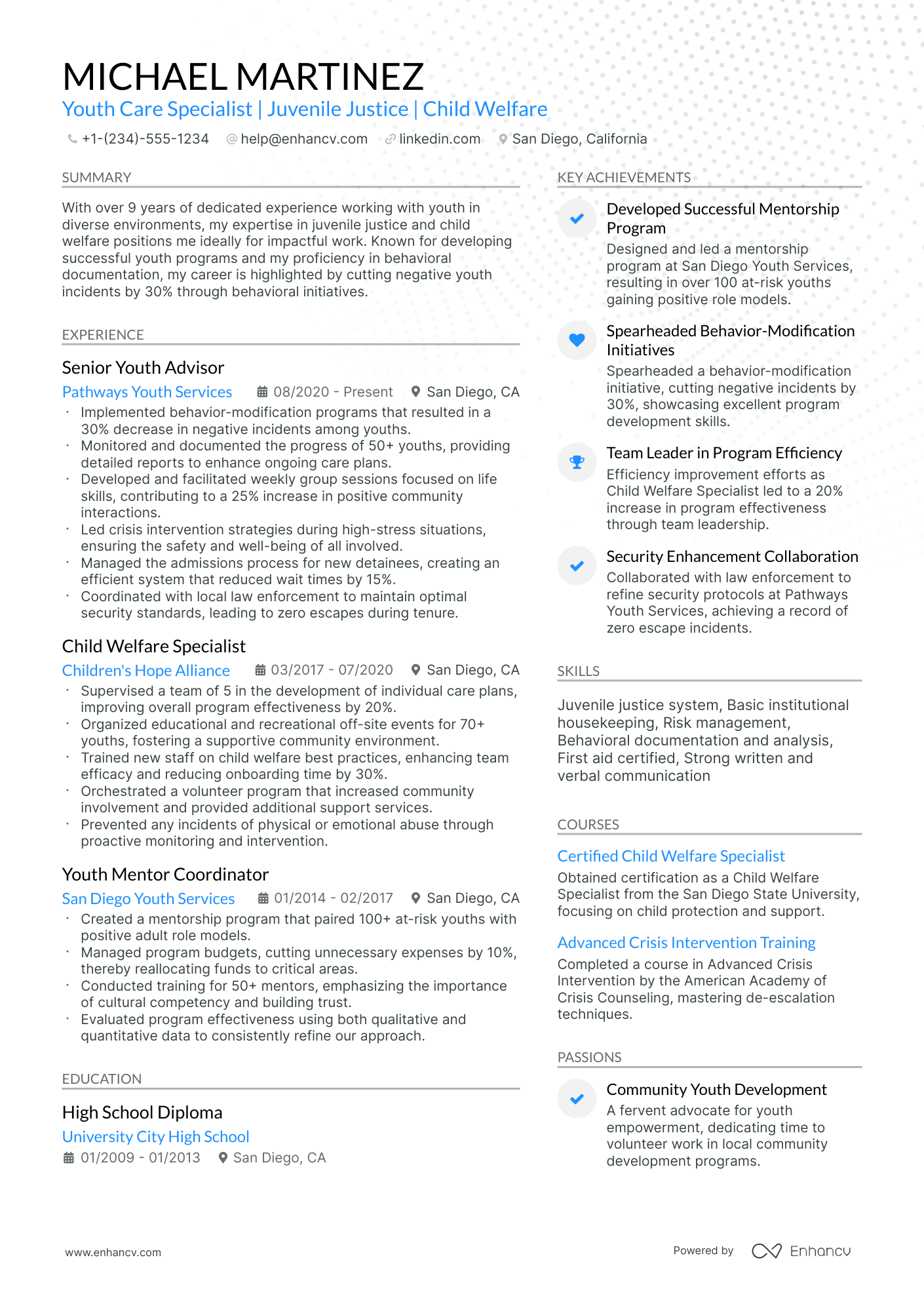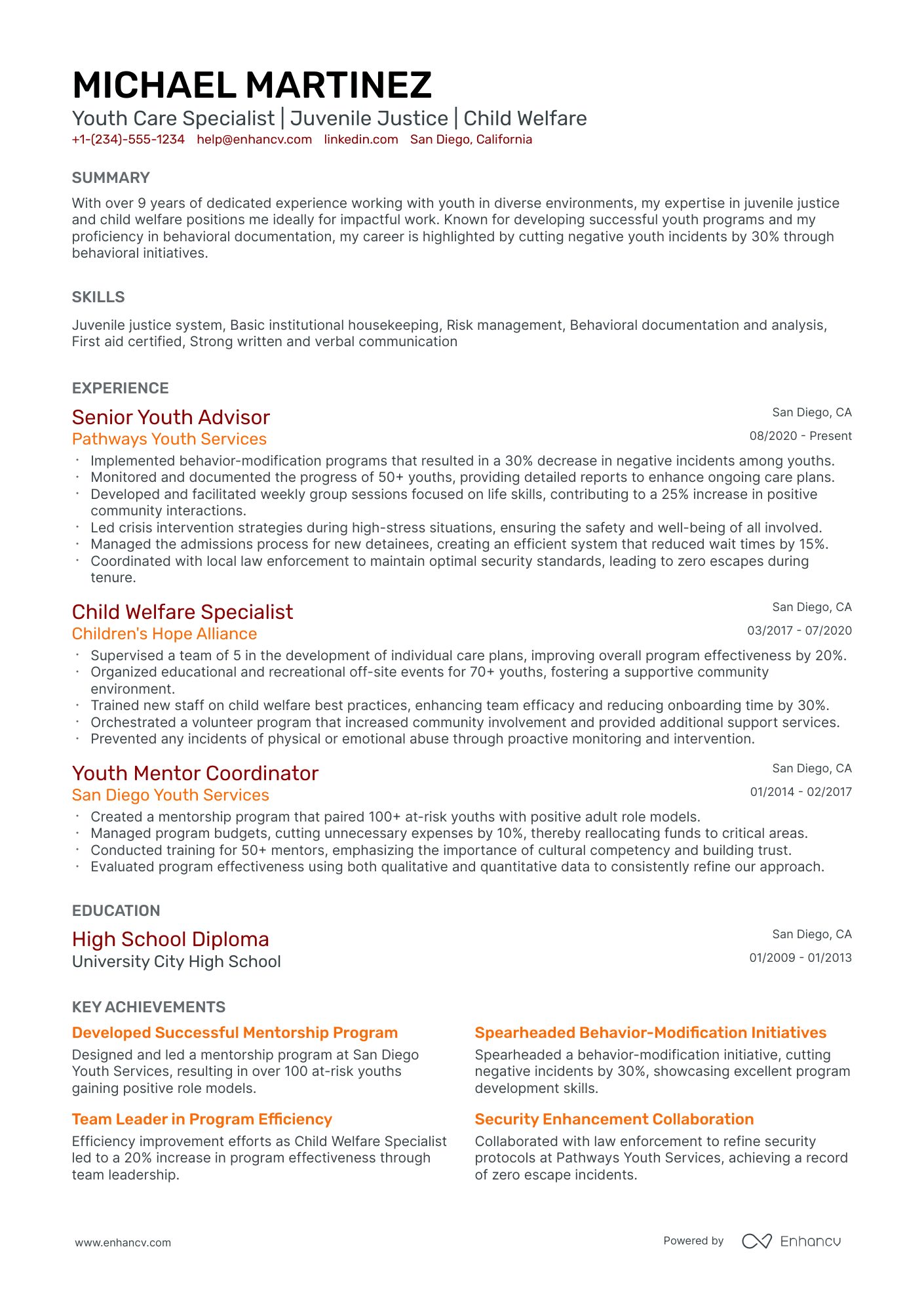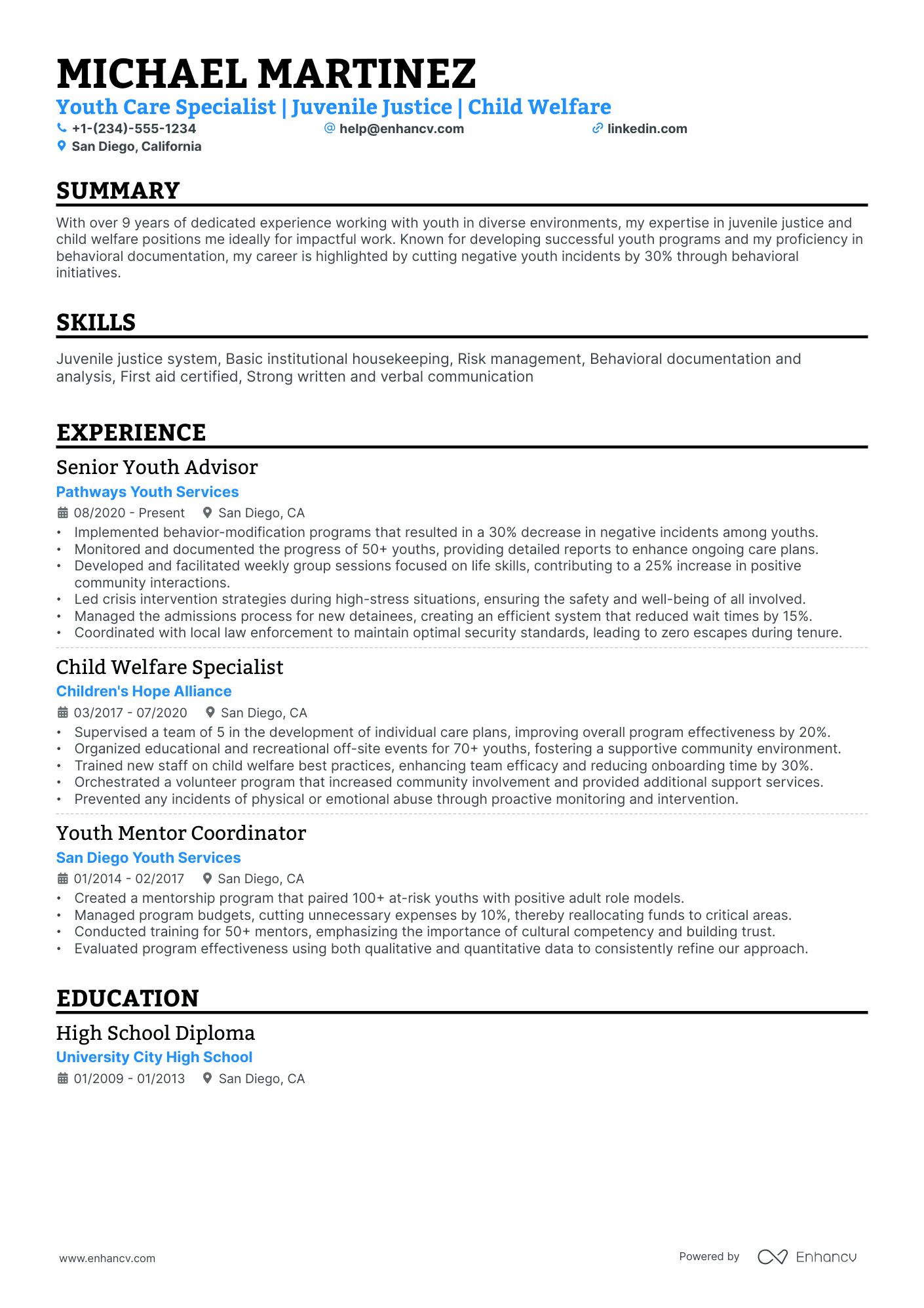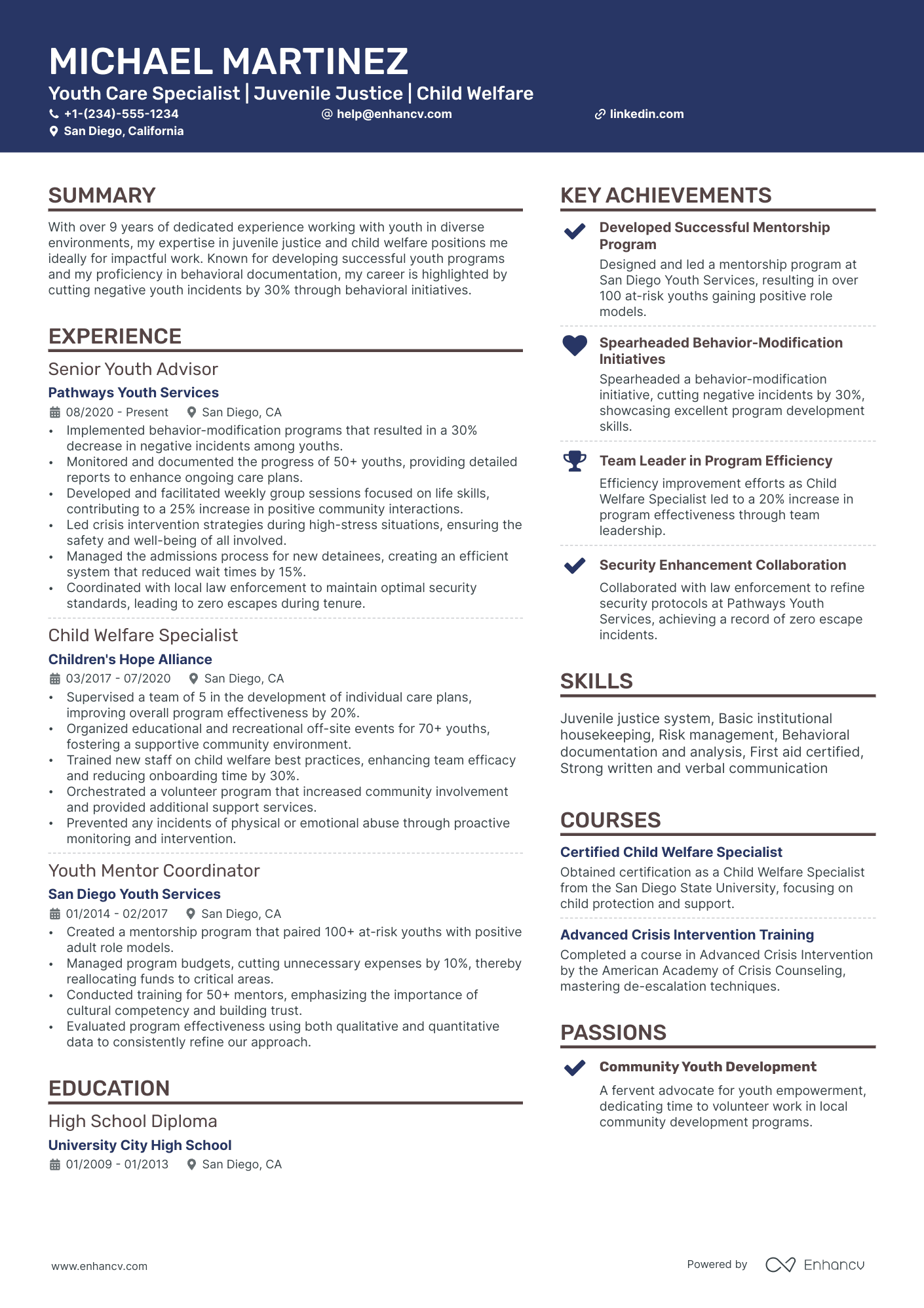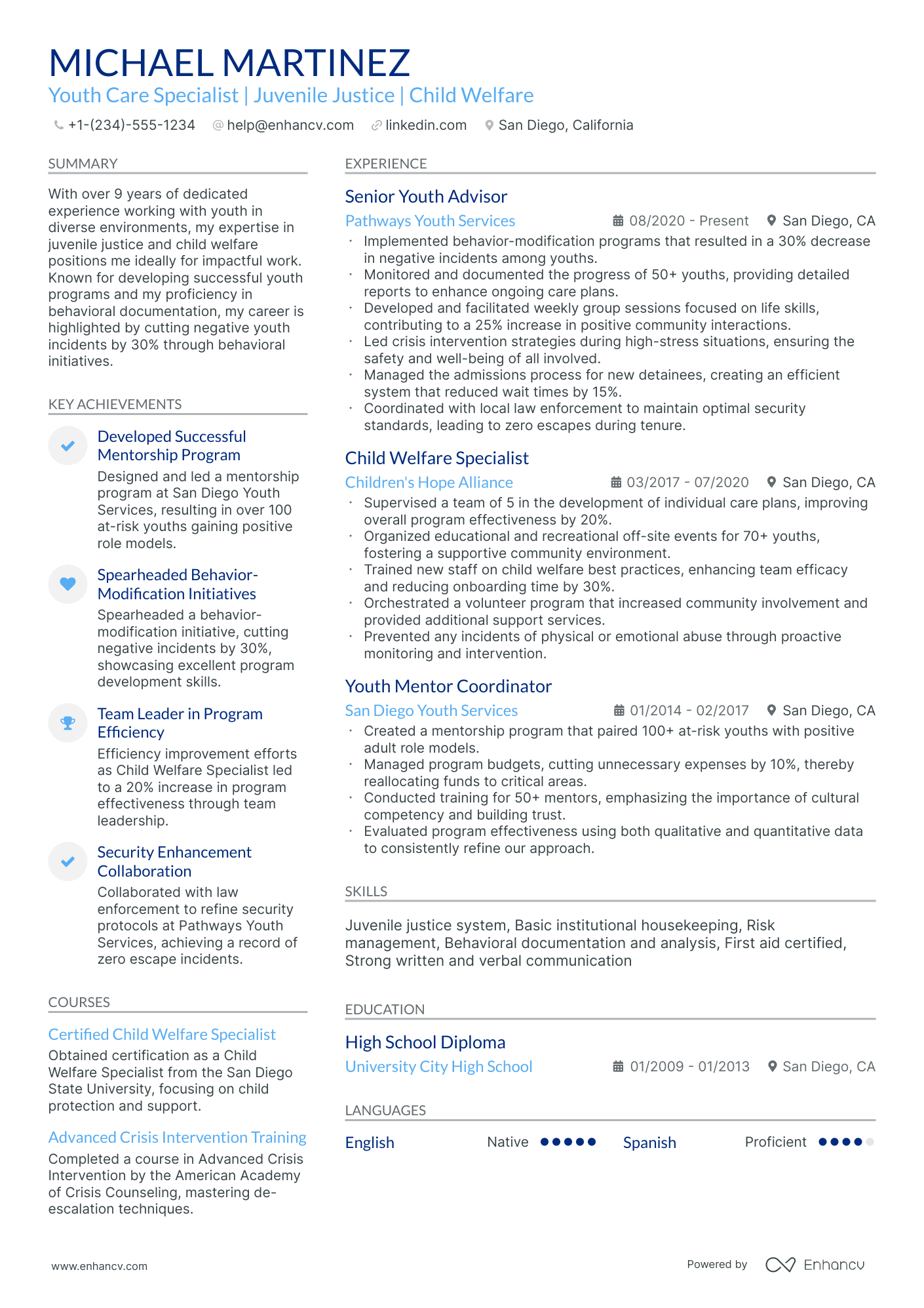As a care worker, articulating the breadth of your emotional intelligence and strong interpersonal skills on a resume can be challenging. Our guide will provide you with practical tips and examples to showcase these essential qualities effectively, ensuring your resume stands out to potential employers.
- Aligning the top one-third of your care worker resume with the role you're applying for.
- Curating your specific care worker experience to get the attention of recruiters.
- How to list your relevant education to impress hiring managers recruiting for the care worker role.
Discover more care worker professional examples to help you write a job-winning resume.
- Psychiatrist Resume Example
- Pediatric Dentist Resume Example
- Infection Control Nurse Resume Example
- Respiratory Therapist Resume Example
- Pacu Nurse Resume Example
- Pediatric Dental Assistant Resume Example
- Health Coach Resume Example
- Social Worker Resume Example
- Ob Nurse Resume Example
- Nurse Anesthetist Resume Example
The ultimate formula for your care worker resume format
Our best advice on how to style your care worker resume is this - first, take the time to study the job advert requirements.
The resume format you select should ultimately help you better align how your experience matches the specific role.
There are four crucial elements you need to thus take into consideration:
- How you present your experience. If you happen to have plenty of relevant expertise, select the reverse-chronological resume format to organize your experience by dates, starting with the latest.
- Don't go over the top with writing your resume. Instead, stick with a maximum of two-page format to feature what matters most about your profile.
- Headers aren't just for "decoration". The header of your resume helps recruiters allocate your contact details, portfolio, and so much more.
- The PDF format rules. It's the most common practice to submit your care worker resume as a PDF so that your resume doesn't lose its layout. However, make sure the read the job well - in some instances, they might require a doc file.
Upload & Check Your Resume
Drop your resume here or choose a file. PDF & DOCX only. Max 2MB file size.
PRO TIP
The more trusted the organization you've attained your certificate (or degree) from, the more credible your skill set would be.
Essential sections that should make up your care worker resume include:
- The header - with your contact details (e.g. email and telephone number), link to your portfolio, and headline
- The summary (or objective) - to spotlight the peaks of your professional career, so far
- The experience section - with up to six bullets per role to detail specific outcomes
- The skills list - to provide a healthy mix between your personal and professional talents
- The education and certification - showing your most relevant degrees and certificates to the care worker role
What recruiters want to see on your resume:
- Demonstrated empathy and compassion for patients
- Relevant certifications such as First Aid, CPR, or specific care qualifications (e.g., CNA, HHA)
- Experience with patient care tasks, such as bathing, dressing, and feeding
- Strong communication skills for interacting with patients, families, and healthcare teams
- Ability to handle physically demanding tasks and work in high-stress environments
The care worker resume experience section: a roadmap to your expertise
The resume experience section provides you with an opportunity to tell your professional narrative.
Recruiters, reading between the lines of your resume, use the experience section to better understand your unique skill set, accomplishments, and what unique value you bring about.
Discover five quick steps on how to write your experience section:
- Curate only relevant experience items to the role and include the company, description, and dates; all followed by up to six bullets per experience item;
- Each experience item should feature tangible results of your actions - if you can include a number or percent, this will further highlight your aptitude;
- If you've received any managerial or customer feedback, use short excerpts of it as further social proof of your technical or people skills;
- Make sure you're using the appropriate verb tense when listing your responsibilities;
- Within the description for each role, you could summarize your most noteworthy and relevant achievements.
Now, take note of how a real-world care worker professional received opportunities at industry leaders with these resume experience sections:
- Managed a team of junior care workers, overseeing the delivery of high-quality personal care to 30+ residents suffering from chronic illnesses
- Spearheaded the integration of a digital record keeping system that improved care coordination by 40%, enhancing patient care and data accuracy
- Conducted weekly workshops on patient handling techniques for new employees, reducing work-related injuries by 25% within the first year
- Provided essential daily care to 20 elderly patients, including medication administration, meal preparation, and hygiene assistance
- Developed personalized care plans in collaboration with healthcare professionals, improving patient well-being and satisfaction scores by 30%
- Acted as a liaison between patients, families, and medical staff, addressing and resolving concerns while maintaining confidentiality and sensitivity
- Implemented a community outreach program that connected 50+ seniors with social services, resulting in a 20% increase in community engagement
- Trained in emergency response procedures, leading to a 100% compliance rating in health and safety audits
- Facilitated support groups for patients with dementia, providing emotional support and enhanced coping strategies for 35 families
- Managed daily operational tasks including scheduling and workflow optimization for a team of 15 care workers
- Delivered compassionate end-of-life care to terminally ill patients, receiving a 95% positive feedback rate from patient families
- Organized and led a multidisciplinary team to develop an innovative fall prevention program, resulting in a 40% reduction in falls
- Assisted clients with activities of daily living, maintaining a high standard of care and helping 25 clients maintain independence at home
- Implemented a nutrition-focused menu for clients with dietary restrictions, enhancing their overall health and wellness
- Collaborated with occupational therapists to develop home modification plans for clients with mobility issues, increasing safety and accessibility
- Offered round-the-clock care to clients with varying degrees of disabilities, dramatically improving their quality of life
- Developed and maintained comprehensive patient records, ensuring regulatory compliance and improving care coordination
- Implemented a patient feedback system, leading to a direct feedback loop from 40+ patients and informed improvements in care delivery
- Led a successful initiative to train care workers on the use of assistive technologies, boosting patients' independence by 35%
- Maintained a client satisfaction rate of 90% by delivering tailored care services to clients with varying health needs
- Coordinated with interdisciplinary healthcare teams to create comprehensive care assessments for over 50 patients
- Organized and executed community recreational activities for residents that enhanced social interaction by 50%
- Conducted home visits and provided health education to at-risk clients, substantially reducing hospital readmissions by 20%
- Pioneered a volunteer assistance program involving 30 volunteers that supported staff in daily activities and improved resident morale
- Expertly managed the care needs of patients with complex health conditions, ensuring tailored support for 100+ clients
- Trained new care workers in providing dementia care, increasing the facility’s capacity to care for this client group
- Championed a care worker wellness program that reduced absenteeism by 15% and improved team morale
- Oversaw the introduction of telemedicine consultations in care routines, increasing access to specialist advice for rural clients by 60%
- Managed care plans for clients with various physical and mental health challenges, enhancing care precision and client satisfaction
- Instrumental in securing a grant of $50,000 for the facility to improve the on-site rehabilitation equipment and services
The following content includes information from "O*NET OnLine" by the U.S. Department of Labor, Employment and Training Administration (USDOL/ETA). Used under the CC BY 4.0 license. The data represents the top responsibilities present on the task lists for care worker professionals.
Top Responsibilities for Care Worker:
- Maintain records of patient care, condition, progress, or problems to report and discuss observations with supervisor or case manager.
- Provide patients with help moving in and out of beds, baths, wheelchairs, or automobiles and with dressing and grooming.
- Bathe patients.
- Care for patients by changing bed linens, washing and ironing laundry, cleaning, or assisting with their personal care.
- Entertain, converse with, or read aloud to patients to keep them mentally healthy and alert.
- Plan, purchase, prepare, or serve meals to patients or other family members, according to prescribed diets.
- Check patients' pulse, temperature, and respiration.
- Provide patients and families with emotional support and instruction in areas such as caring for infants, preparing healthy meals, living independently, or adapting to disability or illness.
- Perform a variety of duties as requested by client, such as obtaining household supplies or running errands.
- Direct patients in simple prescribed exercises or in the use of braces or artificial limbs.
Quantifying impact on your resume
- Include the number of clients you managed at one time to demonstrate your ability to handle multiple care responsibilities.
- Detail the percentage of care plans you contributed to which resulted in improved patient outcomes.
- Mention the specific number of hours of professional training or continuing education you have completed in the care field.
- State the average number of daily or weekly tasks, such as administering medication or providing personal care, you were responsible for.
- List any quantifiable improvements in patient satisfaction scores from surveys or feedback during your tenure.
- Quantify the reduction in incident or error rates you achieved through adherence to safety protocols or process improvements.
- Include the number of interdisciplinary team meetings you've participated in to highlight your collaboration skills.
- Present the amount of cost savings achieved by your suggestions or efficiencies in providing care.
Action verbs for your care worker resume
What if you don't have any experience?
There are two very common scenarios about candidates with less experience. They are either:
- Fresh out of college in search of a care worker role
- Transferring over from a completely different field
Both of these types of candidates still have a shot at landing their first job in the industry.
All they need to do about the experience section of their care worker resume is:
- Consider their strengths - would the outcomes of their previous roles or niche skill sets impress recruiters? Feature those towards the top of your resume
- Exclude any and all irrelevant experience items - remember that at the end of the day, you're telling a story that aims to align with the ideal candidate for the care worker job
- Win recruiters over with personality - perhaps your ambition, dreams, and diligence would make you the perfect fit for the care worker role. Dedicate resume space to detail your personality traits by showcasing how they've helped you succeed in past roles
- Tailor your experience to specific job requirements - ensure your care worker resume answers the advert in the best way possible.
Recommended reads:
PRO TIP
If the certificate you've obtained is especially vital for the industry or company, include it as part of your name within the resume headline.
Creating your care worker resume skills section: balancing hard skills and soft skills
Recruiters hiring for care worker roles are always keen on hiring candidates with relevant technical and people talents. Hard skills or technical ones are quite beneficial for the industry - as they refer to your competency with particular software and technologies. Meanwhile, your soft (or people) skills are quite crucial to yours and the company's professional growth as they detail how you'd cooperate and interact in your potential environment. Here's how to describe your hard and soft skill set in your care worker resume:
- Consider what the key job requirements are and list those towards the top of your skills section.
- Think of individual, specific skills that help you stand out amongst competitors, and detail how they've helped you succeed in the past.
- Look to the future of the industry and list all software/technologies which are forward-facing.
- Create a separate, technical skills section to supplement your experience and further align with the care worker job advert. Find the perfect balance between your resume hard and soft skills with our two lists.
Top skills for your care worker resume:
Medication administration
Personal care assistance
Mobility assistance tools
Health monitoring equipment
First aid and CPR
Basic cooking skills
Assistive technology usage
Safety and hygiene protocols
Record keeping software
Emergency response systems
Empathy
Communication
Patience
Problem-solving
Time management
Teamwork
Adaptability
Conflict resolution
Attention to detail
Cultural sensitivity
Next, you will find information on the top technologies for care worker professonals from "O*NET OnLine" by the U.S. Department of Labor, Employment and Training Administration (USDOL/ETA). Used under the CC BY 4.0 license.
Top technologies for Care Worker’s resume:
- Linux
- UNIX
- FaceTime
- Microsoft Exchange
- Microsoft Outlook
PRO TIP
Highlight any significant extracurricular activities that demonstrate valuable skills or leadership.
How to include your education and certifications on your resume
We're taking you back to your college days with this part of our guide, but including your relevant higher education is quite important for your resume.
Your degree shows recruiters your dedication to the industry, your recent and relevant know-how, and some form of experience in the field.
Your care worker resume education should:
- Include your applicable degrees, college (-s) you've graduated from, as well as start and end dates of your higher education;
- Skip your high school diploma. If you still haven't graduated with your degree, list that your higher education isongoing;
- Feature any postgraduate diplomas in your resume header or summary - this is the perfect space to spotlight your relevant MBA degree;
- Showcase any relevant coursework, if you happen to have less professional experience and think this would support your case in being the best candidate for the role.
As far as your job-specific certificates are concerned - choose up to several of the most recent ones that match the job profile, and include them in a dedicated section.
We've saved you some time by selecting the most prominent industry certificates below.
The top 5 certifications for your care worker resume:
- Certified Nursing Assistant (CNA) - American Red Cross
- Home Health Aide (HHA) Certification - National Association for Home Care & Hospice (NAHC)
- Certified Caregiver (CC) - The American Caregiver Association (ACA)
- Personal Care Assistant (PCA) Certification - National Association for Home Care & Hospice (NAHC)
- Qualified Medication Administration Personnel (QMAP) - Various state health departments or approved training providers
The content below includes information from "O*NET OnLine" by the U.S. Department of Labor, Employment and Training Administration (USDOL/ETA). Used under the CC BY 4.0 license. The data represents the top associations for care worker professionals.
Top US associations for a Care Worker professional
- American Red Cross
- American Society on Aging
- National Association for Home Care and Hospice
- National Council on Aging
- PHI
PRO TIP
Listing your relevant degrees or certificates on your care worker resume is a win-win situation. Not only does it hint at your technical capabilities in the industry, but an array of soft skills, like perseverance, adaptability, and motivation.
Recommended reads:
Should you write a resume summary or an objective?
No need to research social media or ask ChatGPT to find out if the summary or objective is right for your care worker resume.
- Experienced candidates always tend to go for resume summaries. The summary is a three to five sentence long paragraph that narrates your career highlights and aligns your experience to the role. In it you can add your top skills and career achievements that are most impressive.
- Junior professionals or those making a career change, should write a resume objective. These shouldn't be longer than five sentences and should detail your career goals . Basically, how you see yourself growing in the current position and how would your experience or skill set could help out your potential employers.
Think of both the resume summary and objective as your opportunity to put your best foot forward - from the get go - answering job requirements with skills.
Use the below real-world care worker professional statements as inspiration for writing your resume summary or objective.
Resume summaries for a care worker job
- Compassionate and adept care worker with over 6 years of experience providing outstanding support to elderly clients at Sunnyside Care Center. Specializes in creating personalized care plans, administering medication accurately, and fostering a nurturing environment. Celebrated for reducing hospital readmission rates by 25% through diligent patient monitoring and follow-up care.
- Dedicated former educator transitioning into elderly care with a focus on enriching the lives of our senior community. Holds a Bachelor's degree in Psychology, exceptional interpersonal skills, and a proven track record of developing educational programs that cater to diverse learning needs. Seeking to leverage my extensive mentoring experience to promote holistic care and companionship.
- Detail-oriented IT professional pivoting into the healthcare sector, eager to apply my analytical and problem-solving skills to deliver high-quality care. With over 5 years in tech support, I possess strong communication skills and a unique perspective on integrating assistive technology to enhance patient well-being and autonomy.
- Seasoned care worker with 10+ years of experience in fast-paced hospital settings, well-versed in providing critical support for patients with chronic conditions. Renowned for implementing efficient care strategies that improved patient mobility by 30%. Possess advanced certifications in palliative care and consistently receive high praise for empathy and patience.
- Motivated individual aspiring to embark on a compassionate career in elderly care with no prior industry experience. Bringing a strong academic background in Health Sciences and a wealth of volunteer experience at local nursing homes. Committed to learning and excelling in patient care techniques to make meaningful contributions to improving quality of life for the elderly.
- Eager to start a fulfilling career as a care worker, possessing a natural gift for nurturing and a desire to make a positive impact in the daily lives of clients. Although new to the field, my extensive background in volunteer community service has equipped me with key communication and empathetic listening skills essential for client satisfaction and well-being.
Average salary info by state in the US for Care Worker professionals
Local salary info for Care Worker.” Source: My Next Move, National Center for O*NET Development. Accessed 10/15/2024
| State | Average Salary (in USD) |
|---|---|
| US National Average | $33,530 |
| California (CA) | $33,530 |
| Texas (TX) | $22,530 |
| Florida (FL) | $31,040 |
| New York (NY) | $36,450 |
| Pennsylvania (PA) | $29,000 |
| Illinois (IL) | $35,020 |
| Ohio (OH) | $29,290 |
| Georgia (GA) | $27,920 |
| North Carolina (NC) | $28,720 |
| Michigan (MI) | $30,860 |
Miscellaneous care worker resume sections for a more personalized approach
Your care worker resume can reflect even more upon your personality and best qualities - that is if you decide on including a couple of additional resume sections to support your application.
Some of the best-accepted industry-wide choices include the:
- Resume projects - getting into the outcomes of your most important work, so far;
- Languages on your resume - detailing your proficiency level;
- Special recognitions - dedicated to your most prominent industry awards;
- Hobbies and interests - defining how you spend your free time.
Key takeaways
- Invest in a concise care worker professional presentation with key resume sections (e.g. header, experience, summary) and a simple layout;
- Ensure that the details you decide to include in your resume are always relevant to the job, as you have limited space;
- Back up your achievements with the hard and soft skills they've helped you build;
- Your experience could help you either pinpoint your professional growth or focus on your niche expertise in the industry;
- Curate the most sought-after certifications across the industry for credibility and to prove your involvement in the field.
